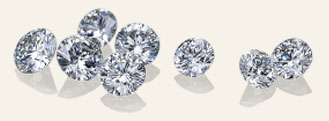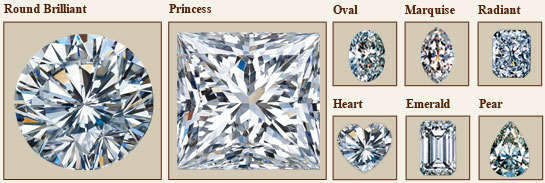A Quick Guide to Buying Diamonds and Diamond Jewelry
Contents

Giving a gift of diamonds is a way of expressing your deepest feelings. The choice you make should be made with care and consideration. You should enter the process with the confidence that you know what to look for in a diamond and how much you should pay. To make selecting a diamond easy for you, we offer you this quick guide to the diamond-buying process.
E-mail to a Friend
Send the Diamond Buying Guide to a friend.
1. Measuring Brilliance
-
Brilliance Defined

The truest measure of a diamond’s beauty is how bright it is — the fire, sparkle and dazzle you see when you look at it. While good color and clarity are important attributes, a diamond’s cut is critical to the resulting brightness and largely a result of the artistry applied. Cutting to precise proportions and ensuring perfect symmetry in the placement of facets allows the maximum amount of light to be refracted from one facet to another, and then dispersed through the top.
-
"Return of Light"

"Return of Light", is the amount of light returned through the top of the diamond and directed to your eye. "Return of Light" – the key element in diamond brightness -- can be scientifically measured and certified using state-of-the art optical technology. GemEx® Systems, an independent gemological laboratory, uses a tool called a BrillianceScope™ to measure "Return of Light" from five different lighting angles.
-
The Leo Challenge

You be the judge of The Leo Diamond's visibly brighter appearance! To prove our point about the Leo Diamond’s superior brilliance, we challenge you to see it for yourself. It’s fun and only takes a few minutes. Locate an authorized Leo Diamond jeweler and ask to take the Leo Diamond Challenge. You’ll be invited to view two diamonds through a GemEx viewer: one a Leo, the other a conventionally cut diamond of comparable carat weight, color and clarity. Then, choose the one that is visibly brighter. We bet you’ll choose The Leo Diamond!
2. Familiarize Yourself with the 4C’s
The 4C’s are the criteria for grading a diamond. They help determine the value as well as the beauty of each diamond.
-
Cut

Cut is the most important characteristic of a diamond, because only a well cut diamond will deliver maximum fire and brilliance.
-
Carat

Carat weight measures a diamond’s size.
-
Color

Color is the natural body color visible in a diamond, ranging from colorless to yellow.
-
Clarity

Clarity indicates a diamond's purity.
Click here to read more about the 4C's.
The 4C's are the key element in diamond certification, which is written proof of a diamond's characteristics and quality. If a diamond is certified, ask to see the certification so you can be assured that the diamond you are buying is of the quality you're paying for, and so that you will have a way to compare one diamond with another.
Independent gemological laboratories issue diamond certification. The best known grading laboratories are: the International Gemological Institute® (IGI); the Gemological Institute of America® (GIA); the American Gem Society® (AGS); Gemological Science International® (GSI), and GemEx® Systems.
3. Choosing a Shape
An important thing to know going in is which diamond shape to choose. The Leo Diamond® is available in round brilliant or princess shapes – the most popular shapes. While a round diamond may appeal to a more traditional woman, a princess is perfect for a woman with slightly more contemporary taste. There are other diamond shapes as well, such as oval, pear, heart, marquise, radiant, emerald, and Asscher.
If you want the presentation to be a surprise, ask her friend, sister or mother which diamond shape they think your fiancée-to-be would prefer.

4. Choosing a Setting
The setting – or mounting – plays an important role in how the diamond looks on a woman's hand.
Consider the following before you decide about the diamond setting.
- Will it be yellow gold, white gold or platinum?
- Would she prefer a solitaire or a three-stone setting?
- Will the band be simple or adorned with smaller stones?
5. Know Her Ring Size
If you’re planning a surprise proposal, you want to make sure to know her ring size so the diamond engagement ring you present her with will slip right onto her finger. Ask her family and friends, borrow a ring, or make an impression of one of her rings in a bar of soap so a jeweler can measure it.
6. Decide How Much You Can Spend
It’s up to you to decide on a budget that makes you feel comfortable. There are beautiful diamonds in all shapes and sizes for every budget. But the beauty and brilliance of a diamond depend largely on how it is cut and polished. So a smaller diamond, magnificently cut can easily out sparkle a larger diamond that has been cut less skillfully. While the rule of thumb for a diamond engagement ring is two months’ salary, whatever your budget, you should be able to find a diamond that will win her heart.
7. Finding A Jeweler You Trust
There are many advantages in buying a diamond from a well-respected retail jeweler. There you will have the best chance of making the right investment and getting the quality, value, and service you need.
Choosing an authorized Leo Diamond jeweler gives you an additional advantage when buying diamonds. Leo Schachter selects its jewelers because of their reputation for excellent service, their insistence on providing only quality merchandise, and their reputation for highly trained and knowledgeable sales associates.
Find an authorized Leo Diamond jeweler near you.
